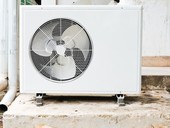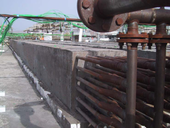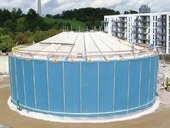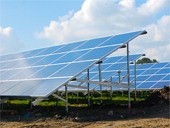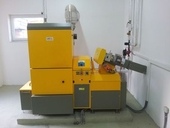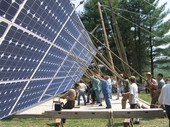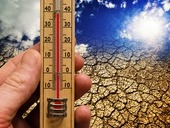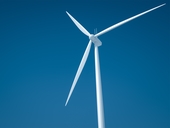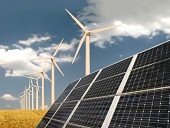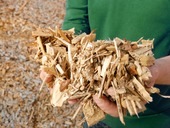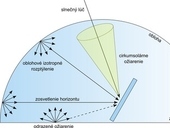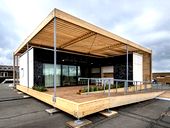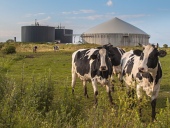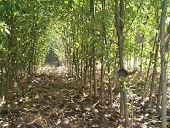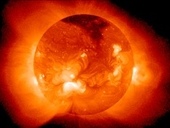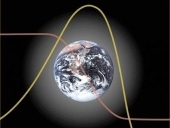The author compares use of heat pump with solar systems serving for heating hot water for a block of flats in Prague, in his study. The meteorological data from the station Prague-Karlov and the program developed in the framework of a diploma work are taken for the comparison. The comparison is elaborated both from the energy point of view and economically from an orientation view.
Archiv článků od 17.2.2014 do 30.6.2014
Surplus energy can be stored in the form of sensible heat. The present concept utilizes rock material and a thermally conductive geopolymer to construct the thermal energy storage with working temperatures up to 400 ° C. The paper describes a model evaluation of the performance impact of selected storage materials.
This paper is focused on hot water tanks for long-term heat storage. Describes the design of the tanks and and their properties. The evaluation of tanks is based on the results of real systems. Tanks are mainly used for solar systems with long-term heat storage. The use of solar systems with long-term heat storage for building opens new possibilities for further savings of energy from non-renewable sources.
The article describes the norm for photovoltaic plant monitoring, EN 61724. It attempts to explain the meaning of measured and derived values, and compares the requirements of the norm with today’s operational practice. The EN 61724 is, in spite of being 15 years old, not very much known, although it contains many useful informations and hints. It is crucially important for comparing of PV power plants between each other, as it standardizes the evaluation processes, which is the basic condition for a meaningful benchmarking.
In 2014 enters or has entered into a joint program to promote the replacement of the obsolete boilers at least five counties. Grants are intended solely for individuals who own property in the county. In addition to its purchase of the boiler it is possible to grant eligible costs include heating, the purchase of pumps, storage tanks, etc.
Reduce the amount of air emissions, provide households and businesses cheaper to heat and at the same time stimulate the economy and encourage the market for renewable energy sources - these are common goals for the Czech, Austrian, German and British government. Each country, however, these objectives released after different way. While our currently running national subsidies in the UK came this spring with a program RHI (Renewable Heat Incentive) for households. In many ways, this program is unique worldwide and will be interesting to see whether it becomes an inspiration for other European countries, hence the Czech Republic.
Although more and more people in the Czech republic understand the principle of net metering, only a minority understands it's purpose as well. Due to Czech negative experience with uncorrected feed-in tariff is any other renewable energy support viewed with suspicion and scepticism. The article explains the purpose of net metering as non-financial mechanism of renewable energy support - what is it good for, what we can expect from it, who will benefit from it and who will carry the costs.
This article assesses the subject of modern and efficient ways of using energy from wood that has been widely discussed within the scientific lectures on fair TECHAGRO and BIOMASS 2014. The author outlines the development of the cross-section of the use of wood fuels from forest management in the context of the application of forest logging residues, or sawdust from wood processing industry in the energy sector in the Czech Republic.
This article focuses on the issue of creation of operating rules that pertain to the field of operational documentation. Operating rules are an essential part of the efficient operation of the property. This article is targeted to the content site of operating rules by various functional use of objects. A method of operation of the building affects the composition of future operating rules. In this article, the individual include the composition and structure defined according to the method of use of the building.
The lecture and the following panel discussion took place following the release of third part of IPCC fifth assessment report (AR5) which was published in Berlin a day before. The event was organized by the Commission for the Environment of the Academy of Sciences of the Czech Republic, Climate Coalition, and the United Nations Information Centre in Prague in cooperation with the Heinrich-Böll-Stiftung Prague.
Three systems dedicated purely for heating of water - one solar thermal and two different photovoltaic - were compared under comparable climate conditions and heat consumption. The comparison was made using simulation software TRNSYS. Subsequently, based on several bids, economic comparison of the three systems was made.
Capacity factor of wind power plants in the Czech Republic according to different sources varies in a huge range from pessimistic “4–14 %” to the optimistic “up to 36 %”. The problem arises when via press releases of the ČTK (Czech Press Agency) erroneous data are distributed, which then influences the public debate.
In fact, the average annual capacity factor of the whole set of wind power plants in the Czech Republic is around 20 % or slightly above this level in the last five years. In the longer term the capacity factor increases, because newer wind farms have annual capacity factor about 25 %.
Pessimistic value of the capacity factor below 15 %, are in a better case based on outdated information, or on data from inconvenient installation locations or turbines with technical problems. In the worst case this involves a focused misinformation. If they are published by not direct opponents of wind energy, suggests such values, if they are considered to be related to the total production of electricity from wind in the Czech Republic, the ignorance of the issue.
Optimistic values around 25 % may be related to newer wind turbines in the Czech Republic. Values well above 25 % could be a data of individual wind turbines, results of a shorter period, or the expected results of future installations of which the rated power of the generator is less than would correspond to the size of the rotor.
Concept Data Support Department of the Ministry of Industry and Trade has prepared this statistical report as a comprehensive national statistics on renewable energy sources. The final part of the report provides statistical data of the categories Energy use of waste and alternative fuels, Hydropower, Wind Power, Photovoltaics, Solar thermal systems, Heat pumps and Geothermal energy.
One of the most important boundary conditions occuring in the thermal building simulations is the thermal power penetrated into building elements as a result of the solar radiation. Intensities of the solar radiation are usually measured by weather-stations on the horizontal plane, and thus not directly applicable for the computations. Paper provides the methodology for recomputation of the total solar radiation measured by the pyranometer on the horizontal surface to the intensities of arbitrarily oriented wall and provides simulation results for the nineteen days.
In October 2013 in Orange County Great Park in city of Irvine, California, took place the sixth edition of the prestigious international competition of universities U.S. Solar Decathlon 2013. This round took part also Team Czech Republic from the Czech Technical University in Prague, which finished at overall third place. The article describes in detail building services used in the AIR House.
Concept Data Support Department of the Ministry of Industry and Trade has prepared this statistical report as a comprehensive national statistics on renewable energy sources. First part of the report focuses on the position of RES in the energy balance of the Czech Republic and describes in detail the development of the category of biogas and liquid biofuels.
According to an official decision the fusion energy is not a renewable energy source. This ad hoc decision ignores the basic physical reality and the condition to some extent reminds the inquisition, because some people impose their opinion as superior to the logic and nature itself. This article points out a possible cause of negative attitudes towards nuclear fusion, and to all nuclear sources without knowledge of the facts.
zpět na aktuální články
